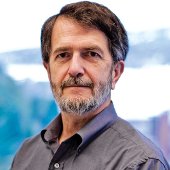| |
Wayne Pennington, chair of the geological and mining engineering and sciences department, has been named president of the American Geosciences Institute (AGI).
Pennington received degrees in geophysics and geology from Princeton University (BA in 1972), Cornell University (MS in 1976) and the University of Wisconsin-Madison (PhD in 1979). He has been a professor of geophysical engineering at Michigan Tech since 1994 and became GMES department chair in 2003.
Prior to Michigan Tech, he worked with Marathon Oil and as an assistant professor at University of Texas at Austin. He has held numerous other positions during his career, most recently being a Jefferson Science Fellow at the US Department of State and USAID (Agency for International Development). He also was the chair of the AGI Board of Heads and chairs of earth and space science departments, and first vice president of the Society of Exploration Geophysicists.
During his appointment as a Jefferson Science Fellow, he worked in the Office of Infrastructure and Engineering within the Bureau of Economic Growth, Agriculture and Trade. After USAID's Office of Science and Technology was created in 2010, he shared his appointment in that office.
In those positions, he first worked on issues relating to earthquake hazard in Afghanistan and science and engineering projects in Pakistan. When the magnitude 7.0 Haiti earthquake occurred, he used the rest of his appointment to coordinate scientific and engineering teams heading to Haiti, to present talks for nontechnical audiences on the seismology of Haiti, and to co-organize a workshop on infusing Haiti's reconstruction with science and engineering.
The AGI is a nonprofit federation of fifty geoscientific and professional associations that represents more than 250,000 geologists, geophysicists and other earth scientists. Founded in 1948, AGI provides information services to geoscientists, serves as a voice of shared interests in the profession, plays a major role in strengthening geoscience education, and strives to increase public awareness of the vital role the geosciences play in society's use of resources, resiliency to natural hazards and interaction with the environment.
|

